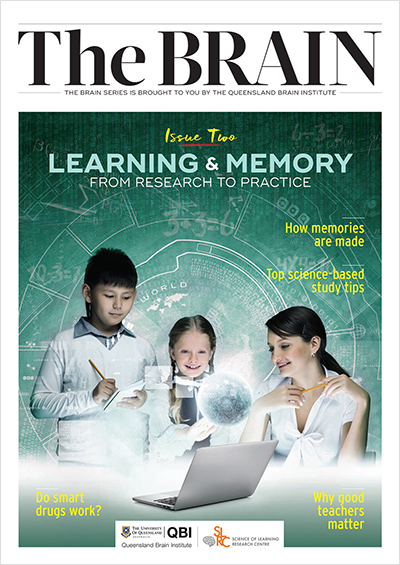Neuronal plasticity, the extraordinary ability of neurons and neural circuits to change with experience, is a fundamental brain principle that provides a framework to understand processes such as learning and memory. While these changes occur across multiple domains of neuronal structure and properties, a fascinating and perhaps extreme form of neuronal plasticity is the addition of new neurons into existing circuitry i.e., neurogenesis. This is what drives Queensland Brain Institute (QBI) researchers to understand mechanisms that drive the production and integration of new neurons in the adult brain and investigate the functions of adult-born neurons in the regulation of emotion and cognitive processes in health and disease.
Research highlight
A decade-long research project, led by Emeritus Professor Perry Bartlett and Dr Daniel Blackmore, showed that the cognitive ability of elderly mice was improved following defined periods of exercise. Find out about the optimal period ,or ‘sweet spot’, that greatly improved their spatial learning.
Hear from our researchers
Professor Jason Mattingley, Group Leader
 “I am interested in the computations the brain performs to regulate human behaviour – attention, decision making, learning and memory, and so on. Discovering these computations helps us understand and predict why people behave the way they do in all kinds of contexts – from driving a car to planning a career. This knowledge can also help us diagnose and treat cognitive and behavioural problems that arise from brain injury and disease. I chose to follow this path because the brain regulates the way we feel, think and behave, and people’s thoughts and behaviours are endlessly fascinating.
“I am interested in the computations the brain performs to regulate human behaviour – attention, decision making, learning and memory, and so on. Discovering these computations helps us understand and predict why people behave the way they do in all kinds of contexts – from driving a car to planning a career. This knowledge can also help us diagnose and treat cognitive and behavioural problems that arise from brain injury and disease. I chose to follow this path because the brain regulates the way we feel, think and behave, and people’s thoughts and behaviours are endlessly fascinating.
My lab’s research on neurofeedback could one day provide a novel avenue for improving human performance in real-world tasks, such as monitoring and controlling complex displays. The work also has potential clinical applications in people who have suffered a brain injury, such as a stroke, to help them regain perceptual, cognitive and motor functions.
The Queensland Brain Institute gives researchers the time and space they need to conduct blue-sky research into brain function. It is this kind of curiosity-driven research that has yielded the most important scientific knowledge, and has in turn provided the foundation for the development of applications for the benefit of all humankind. I hope we see basic, curiosity-driven research continue to grow and flourish at QBI; that we are able to translate our discoveries into new technologies, devices and treatments; and that we build and maintain a diverse, equitable and collegial team of brain scientists.“
Dr Roger Marek, Early Career Researcher, Sah Group
 “Emotional memories are some of the strongest memories there are, and fear related trauma can have a huge impact on individuals, especially if they interfere with daily tasks, such as hearing a sudden loud noise while shopping. I study the neural circuit involved in emotional memories, particularly with fear and its extinction. The hope is to improve the intervention strategies for people living with this trauma.
“Emotional memories are some of the strongest memories there are, and fear related trauma can have a huge impact on individuals, especially if they interfere with daily tasks, such as hearing a sudden loud noise while shopping. I study the neural circuit involved in emotional memories, particularly with fear and its extinction. The hope is to improve the intervention strategies for people living with this trauma.
The Queensland Brain Institute has established itself as a leading and worldwide renowned brain research institute that provides all the state-of-the-art equipment we need to undertake research. It supports interdisciplinary research and encourages collaborations, which I believe are critical for success and new discoveries.”
Umanda Madugalle, PhD Student, Bredy Group
 “I’m interested in how the brain adapts and learns from experience, in particular fearful experiences, with my PhD project, involving the development and application of innovative techniques, studying the learning processes in fear learning and memory at the genetic level. I hope this type of fundamental science can be used to manipulate specific genes for therapeutic development for post traumatic stress or phobias.
“I’m interested in how the brain adapts and learns from experience, in particular fearful experiences, with my PhD project, involving the development and application of innovative techniques, studying the learning processes in fear learning and memory at the genetic level. I hope this type of fundamental science can be used to manipulate specific genes for therapeutic development for post traumatic stress or phobias.
The Queensland Brain Institute is a lively and fast-paced environment with a great sense of community, offers fantastic learning opportunities, and houses facilities that fast track many aspects of conducting research.”


